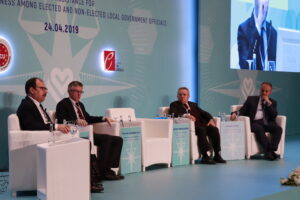
Technical Assistance for Implementation of Civil Society Dialogue and Civil Society Support Programmes (TR2015/DG/01/A5-01/001)
The overall aim of the project is to increase bilateral exchanges and cooperation between CSOs in Turkey and the EU at local, regional and national levels, to promote awareness raising initiatives on importance and benefits of membership of Turkey to the EU within Turkey and EU and on

Visibility and Communication for Actions Related to AA/DCFTA Implementation in the Framework of the EU Funded Assistance Programmes
The National Implementation Plan of the EU-Moldova Association Agreement (AA) establishes key priorities to foster political association and economic integration with the EU, including actions assigned to institutions involved in the AA/DCFTA (Deep and Comprehensive Free Trade Area). The DCFTA defines a preferential, mutually advantageous trade relationship between

Technical Assistance for Strengthening Institutional Capacity of the Judiciary and Execution System for the Fight against Addiction
The contract will contribute to the improvement of institutional capacity of judiciary in terms of fight against drug addiction. In this context the contract will cover activities such as trainings, workshops, needs assessment, drug addiction awareness raising group programmes, family counselling programmes, establishment of a monitoring and integration

Technical Assistance for EU-Turkey Anatolian Archaeology and Cultural Heritage Institute
The project is intended to improve intercultural dialogue between Turkey and the EU by protecting and promoting items of common cultural heritage and by strengthening civil society dialogue on such matters. It will improve access to the archaeological heritage and historical works of ancient Anatolian civilizations by identifying,

Technical Assistance for Prevention of Corruption and Promotion of Ethics
Despite the OECD’s assessment that Turkey has made significant progress since 2007 in its efforts to combat corruption, the issue continues to represent an obstacle to economic and social progress and, potentially, to greater integration with the EU. The overall objective of the project was to contribute to

Training and Establishing Meal Department (Monitoring, Evaluation, Accountability, And Learning)
The implementation of effective monitoring, evaluation, accountability, and learning (MEAL) are vital to the success of all programs. In this regard, the purpose of the project was to provide accountability to their stakeholders through information sharing and developing complaints or feedback mechanism which can help to guide program

